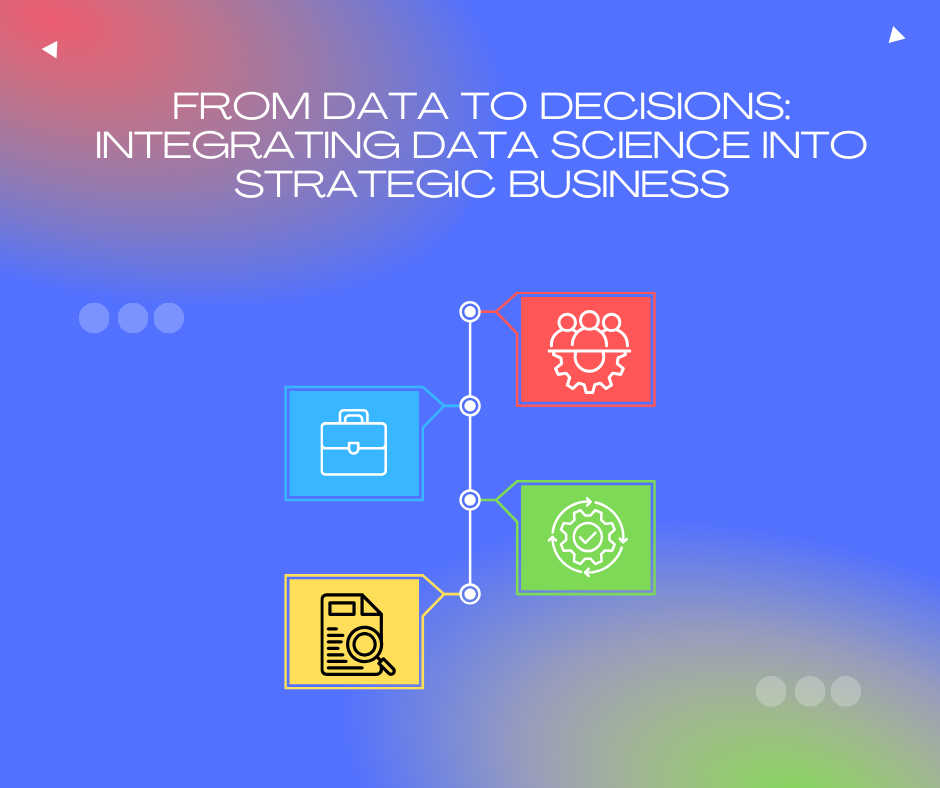From Data to Decisions: Integrating Data Science into Strategic Business
 Ruhi Parveen
Ruhi Parveen
Data science has become a pivotal tool for businesses seeking a competitive edge, allowing them to make informed, data-driven decisions. By harnessing data science techniques, companies can transform raw data into actionable insights, optimizing operations, improving customer satisfaction, and boosting profitability. This guide explores the role of data science in strategic business, its benefits, challenges, and best practices for successful integration.
1. The Role of Data Science in Modern Business
Data science involves extracting meaningful patterns and insights from large datasets using statistical, computational, and machine learning techniques. It allows businesses to:
Identify Trends and Patterns: By analyzing historical data, companies can identify market trends, customer preferences, and operational bottlenecks.
Predict Future Outcomes: Data science helps in forecasting future events, enabling proactive decision-making and strategic planning.
Optimize Business Processes: From inventory management to marketing campaigns, data science enhances operational efficiency.
As businesses face growing data volumes from multiple sources (customer interactions, social media, IoT devices), integrating data science becomes essential for informed and strategic decision-making.
2. Benefits of Data-Driven Decision Making
Embracing data science for decision-making offers numerous advantages, which are crucial for maintaining competitiveness and resilience.
1 Enhanced Customer Insights
Data science can reveal detailed insights into customer behavior, preferences, and needs, enabling businesses to personalize services, predict buying patterns, and improve customer satisfaction. Targeted marketing strategies and tailored products lead to increased customer loyalty.
2 Operational Efficiency and Cost Reduction
Data science helps optimize internal processes, reducing waste and minimizing costs. For example, predictive maintenance in manufacturing can forecast machinery breakdowns, preventing costly downtimes. Efficient resource allocation, streamlined operations, and reduced risk contribute to substantial cost savings.
3 Better Risk Management
Data science aids in assessing risks by analyzing market conditions, financial data, and other risk factors. For industries like finance and insurance, it allows companies to detect fraudulent activities and mitigate risks proactively.
4 Informed Strategic Planning
Data-driven insights enable companies to make well-founded strategic decisions, like market entry, product launches, or expansion strategies. With predictive analytics, businesses can evaluate the potential outcomes of various scenarios, aligning strategies with real-world data.
3. Key Components of Data Science Integration in Business
Integrating data science into business strategies requires more than just adopting technology. Companies need a structured approach to ensure data-driven practices are embedded into their core processes.
1 Data Collection and Management
A comprehensive data strategy starts with identifying relevant data sources. Businesses collect data from various sources, including customer databases, CRM systems, social media, and third-party providers. Effective data management ensures data is accurate, accessible, and compliant with regulations.
2 Data Analysis and Interpretation
Analyzing data involves transforming raw information into insights through statistical and machine learning models. This process is critical for uncovering hidden trends and patterns that can influence decision-making.
3 Data-Driven Culture
Creating a data-centric culture within the organization is essential for successful integration. Employees at all levels should understand the importance of data and how to utilize it in their roles. Regular training and fostering a mindset of continuous improvement encourage employees to embrace data-driven practices.
4 Data Privacy and Security
With data collection comes the responsibility to ensure its privacy and security. Adherence to data protection regulations (like GDPR) and robust cybersecurity measures prevent data breaches, maintaining customer trust and protecting company reputation.
4. Applications of Data Science in Various Business Functions
Data science can transform different business areas, from marketing and sales to supply chain and finance. Here’s how it impacts key business functions.
1 Marketing and Sales
In marketing, data science enables companies to create targeted campaigns based on customer behavior, demographics, and purchasing history. Techniques like customer segmentation and predictive analytics optimize marketing efforts, enhancing lead generation and conversion rates.
2 Supply Chain and Logistics
Data science helps streamline supply chain operations by forecasting demand, managing inventory levels, and optimizing routes. Predictive analytics reduces lead times and prevents supply chain disruptions, leading to improved delivery performance and customer satisfaction.
3 Finance and Risk Management
In finance, data science models assess credit risks, detect fraud, and analyze market trends for better investment strategies. Financial institutions rely on predictive analytics to minimize risks and enhance regulatory compliance.
4 Human Resources
Data science assists HR departments in improving recruitment, employee retention, and performance management. Predictive models can help forecast attrition rates, while sentiment analysis tools assess employee engagement, helping HR make data-driven decisions to improve workplace culture.
5 Product Development
Data science supports product development by analyzing customer feedback, market trends, and competitors’ offerings. By assessing customer needs, companies can develop products that meet market demands and reduce the risk of unsuccessful launches.
5. Challenges in Integrating Data Science into Business Strategy
While the benefits are clear, integrating data science into a business strategy isn’t without challenges. Companies often face several obstacles:
1 Data Quality Issues
Data science is only as good as the data it analyzes. Poor data quality—like inaccurate, incomplete, or outdated information—can lead to misleading insights. Ensuring data accuracy and consistency is essential for reliable outcomes.
2 Talent Shortage
Data science expertise is in high demand, and finding skilled professionals can be challenging. Businesses often face a shortage of qualified data scientists, data engineers, and analysts. Upskilling existing employees or partnering with external experts may help address this gap.
3 High Implementation Costs
Data science initiatives can be costly due to investment in technology, infrastructure, and talent. Smaller businesses, in particular, may struggle with the upfront costs, which could limit their data science capabilities.
4 Integration with Existing Systems
Incorporating data science into existing workflows and systems may require substantial adjustments. Legacy systems may lack the capacity to process and analyze large datasets, necessitating updates or replacements.
5 Data Privacy Concerns
In an era of increasing data regulation, businesses must ensure compliance with privacy laws. Mismanagement of personal data can lead to regulatory fines and reputational damage. Companies should prioritize data governance and ethical practices in their data science initiatives.
6. Best Practices for Integrating Data Science into Business Strategy
Successfully embedding data science into a business strategy involves a systematic approach that aligns data science initiatives with the organization’s goals.
1 Define Clear Objectives
Before implementing data science, businesses should identify specific objectives. Whether it’s improving customer satisfaction, increasing revenue, or reducing costs, having clear goals ensures data science efforts align with the company’s strategic vision.
2 Invest in the Right Technology and Tools
Choosing the right tools and technologies is crucial. Cloud-based platforms, data visualization tools, and machine learning frameworks enhance data processing capabilities. Companies should evaluate tools that integrate seamlessly with existing systems.
3 Build a Skilled Data Science Team
A team of skilled data scientists, analysts, and engineers is vital for successful integration. Hiring or upskilling employees in data science ensures a knowledgeable team can extract actionable insights from data.
4 Implement a Scalable Data Strategy
Businesses should ensure their data strategy can scale as the company grows. A scalable data infrastructure supports larger data volumes, new data sources, and advanced analytics over time.
5 Encourage Cross-Departmental Collaboration
Data science impacts multiple departments; hence, collaboration is key. Regular interactions between data science teams and other departments (like marketing, finance, and HR) enhance data-driven decision-making across the organization.
6 Prioritize Data Ethics and Compliance
Businesses must prioritize data privacy and adhere to regulations. Establishing a data governance framework and ensuring transparency in data usage build trust with customers and stakeholders.
7. Future Trends in Data Science for Business Strategy
As data science evolves, several emerging trends are shaping its role in business strategy:
1 Artificial Intelligence and Machine Learning Integration
AI and ML are becoming increasingly integral to data science, enabling real-time insights and automation. Businesses are using ML models for predictive analytics, recommendation systems, and customer behavior analysis.
2 Real-Time Data Analytics
Real-time analytics enables businesses to respond promptly to changes. With advancements in IoT and cloud computing, companies can analyze data in real-time, providing agility in decision-making.
3 Natural Language Processing (NLP)
NLP allows computers to understand and interpret human language, which is beneficial for customer service and sentiment analysis. Businesses can leverage NLP to gain deeper insights from customer feedback and social media.
4 Data Democratization
The trend towards data democratisation empowers employees to make data-driven decisions independently. User-friendly data visualisation tools and dashboards make it easier for non-technical staff to access and understand data.
8. Conclusion
Integrating data science into business strategy is a powerful approach to achieving a competitive advantage. From enhancing customer insights to improving operational efficiency, data science empowers businesses to make informed decisions. For those aiming to build a skilled team, pursuing the Best Data Science Training in Noida, Delhi, Mumbai, Indore, and other parts of India can be a vital step. However, success also requires a structured approach and a commitment to data ethics. By embracing a data-driven culture and adapting to emerging trends, companies can navigate challenges and leverage data science as a core component of their strategic vision.
Subscribe to my newsletter
Read articles from Ruhi Parveen directly inside your inbox. Subscribe to the newsletter, and don't miss out.
Written by

Ruhi Parveen
Ruhi Parveen
I am a Digital Marketer and Content Marketing Specialist, I enjoy technical and non-technical writing. I enjoy learning something new.